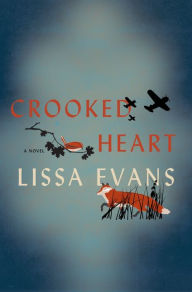Lissa Evans’s fourth novel is set in and around London during the Blitz in WWII. The characters are ordinary people, not homefront heroes like midwives or wardens or detectives. Well, I say ordinary, but like the best fiction, Crooked Heart shows us how extraordinary each life may be.
In the remarkable prologue, we are introduced to orphaned 10-year-old Noel who lives with his godmother in Hampstead. Mattie, a suffragette in her younger days, has retained her free-thinking ways, treating Noel to an eccentric and wonderful education. However, she is beginning to suffer from dementia. As she struggles to remember words and where she put things, the wordplay and accommodations between Mattie and Noel are wonderful to behold.
I’m generally not fond of prologues, but I loved this one. In fact, I thought it the best part of the book.
All good things come to an end, including Mattie, and ostensibly under the care of her cousins, Noel is evacuated to St. Albans. Unprepossessing and limping from a bout with polio, Noel is the last child to find a home. Finally, Vera Sedge snatches him up for the sake of the stipend and extra rations she’ll receive.
Vera, known as Vee, is a widow who barely makes ends meet by sewing notions for hats and engaging in various small money-making schemes. She has little affection to spare for Noel since she is absorbed in waiting on her no-good grown son and elderly mother who spends her time writing letters to Churchill.
Noel, however, is quite brilliant and, thanks to Mattie, creative at coming up with unusual solutions to problems. He and Vee become partners in petty crime.
Much of the joy in this book is seeing how their relationship develops. The description of wartime London, where the two conduct their activities, is brilliant. More than what it’s like to take refuge from the bombs in a shelter or the unsettling disappearance of buildings, we learn about the plethora of minor crime going on while ordinary mores seem to be suspended. I also enjoyed the glimpses of regular life continuing during the Blitz, how people adjust to the new normal.
Much of the story is light-hearted, but it has its dark side—and I’m not just talking about bombs. The reader cannot help but share Vee’s ongoing panic about how to make ends meet and the extremes she’s willing to go to in order to pay the rent—just like today when so many are struggling to survive.
How can you not consider stealing a loaf of bread if your children are hungry? And I’m not just talking about the Blitz or Jean Valjean. People are starving today, even in the richest country in the world. People—especially single mothers—are unable to pay the rent and are thrown onto the street.
I’m sure there are those who would describe this novel as charming or heart-warming. Perhaps it is my own background that makes me so aware of the shadow of desperate poverty that haunts the comic shenanigans of Vee and Noel. As in drawing, thought, the shading adds depth and power to this story.
Have you read a novel that is by turns funny and sad, light-hearted and dark?

